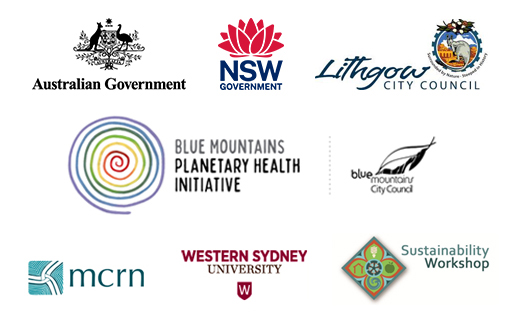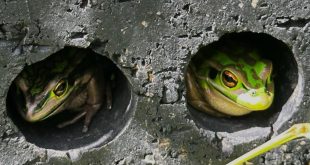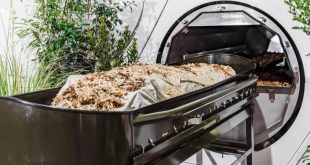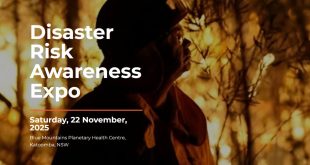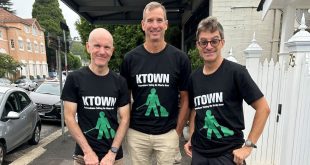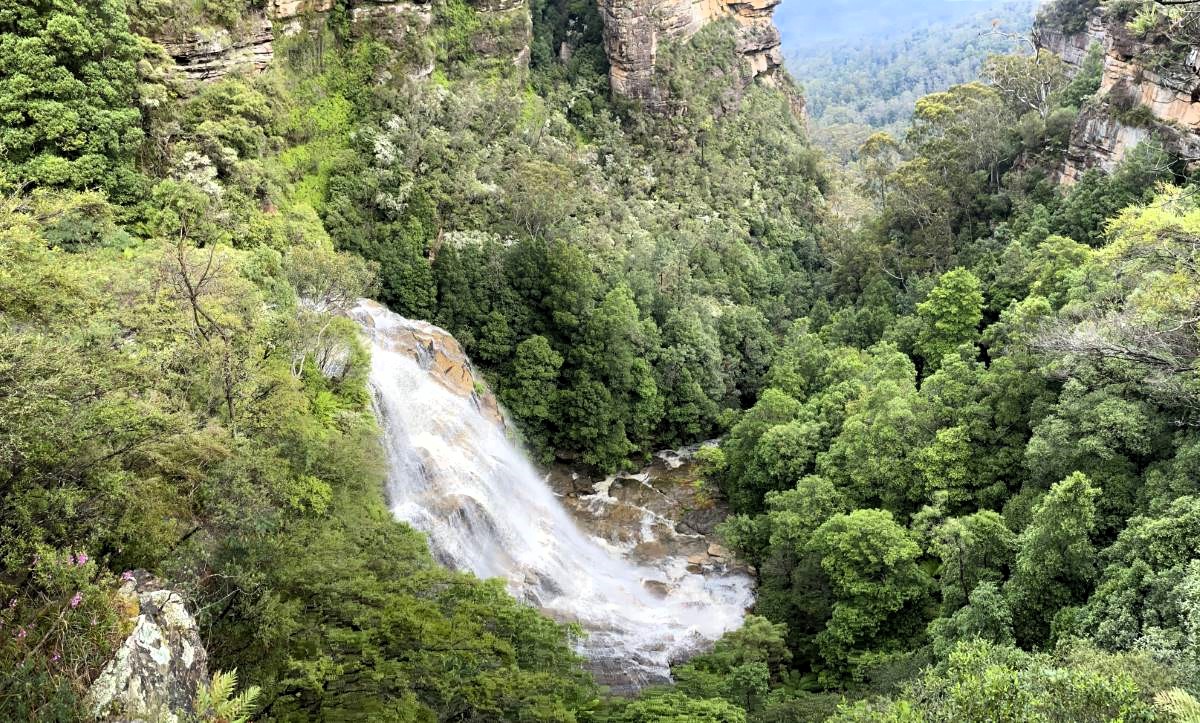
A cool natural zone – Bridal Veil Falls viewed from the lookout of the Leura Cascades walk.
Story and photos by Linda Moon
When temperatures soar and your home heats up, tempers can easily become frayed and your health can take a hit. Not everyone has the benefit of air-conditioning, and all-day running costs are prohibitive for many people. In this guide we’ve provided some tips to help you cool down, and a sample of free and low-cost places to visit to escape the heat in the Katoomba area.
You can also visit or call the Blue Mountains Visitor Information Centres at Glenbrook or Katoomba for more ideas on where to go and what to do when the weather heats up or you’re not sure about the conditions. Also check out our other Cool Mountains Guides in the Lower Mountains, Springwood area, Mid Mountains, and Blackheath area.
Health and Safety in the heat
If you are sweltering at home or venturing out and about in the heat, the NSW Department of Health’s “Keep cool, stay hydrated” online guide is a good starting point to help you, your family and friends stay safe during high temperatures.
The Department advises you should drink plenty of water regularly, even if you don’t feel thirsty. If your doctor has asked that you limit your fluid intake, ask how much water you should drink during hot weather. Do not replace your water intake with alcoholic or sugary drinks and carry water with you if you are spending time outdoors.
If you prefer to stay at home, the Department provides the following tips, especially helpful if you don’t have air-conditioning and/or your fans aren’t making a big impact:
- Wear light, loose-fitting clothes.
- Avoid being outdoors in the hottest part of the day as much as possible. If you have to go outside, seek shade or shelter.
- Close curtains and blinds to block out the sun.
- Spend time in the coolest area of your home.
- Limit physical activity e.g. household chores or exercise to early in the morning when it is coolest.
- Use stoves and ovens as little as possible as these can heat up the home.
- Wet your skin with cool water using a spray bottle or a damp sponge or cloth.
- Place cool packs or crushed ice in a damp towel loosely over your neck and shoulders.
- Take cool showers or baths or sit for a while with your feet in cool water.
- When it becomes cooler outside, open your windows and doors to allow the warm air out and the cool air in.
The Department recommends people seek out cool places or air-conditioned public facilities you can safely travel to without getting too hot. When outdoors, you should protect yourself from the sun by applying sunscreen and wearing sun-protective clothing, sunglasses and a wide brim hat.
The following guide provides ideas for places you can visit in the Katoomba area to cool down, in air-conditioning and outdoors.
Icon key
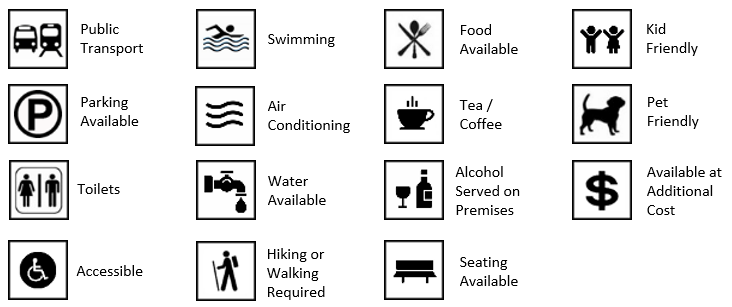
Note – pet-friendly sites don’t necessarily mean it is an off-leash area. Check with the venue before letting your dog off leash
Arts and Cultural Spaces
Escape the heat and enjoy some local Blue Mountains arts, crafts and creativity. There are a number of fantastic free galleries, museums and art spaces available to visit across the Mountains. Here are the best in your area.
Blue Mountains Cultural Centre










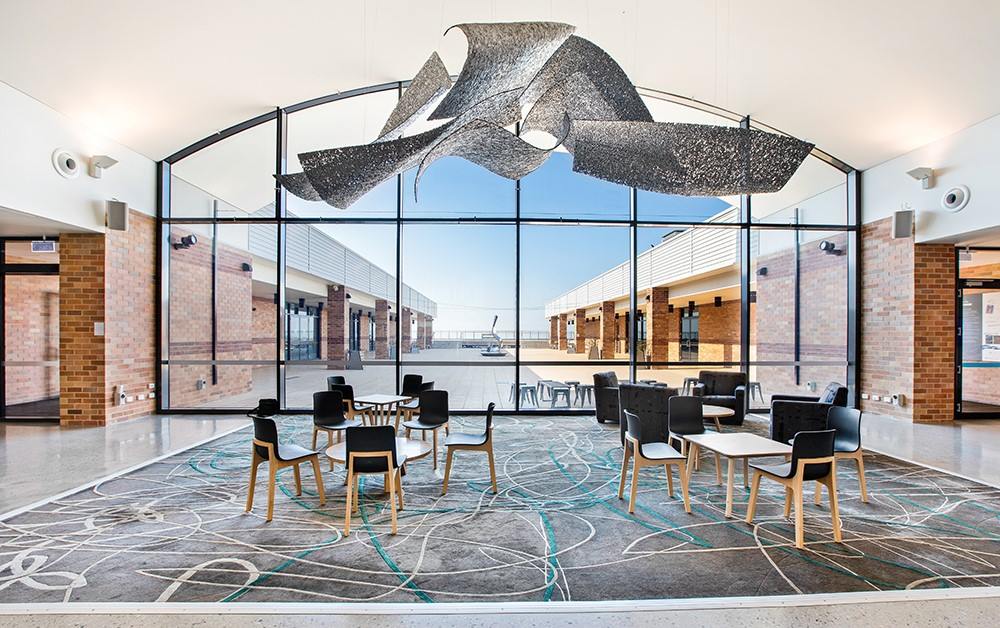
Blue Mountains Cultural Centre (Photo: Liam Foster)
A chill, open-plan space, the Cultural Centre houses an art gallery/exhibition space, Katoomba Library, small shop and café. To enter the gallery, and depending on what’s on, there’s a small charge: $5.50 for adults; $3.20 concession; kids under 16 free. Scattered chairs in the free community space offer somewhere to hang in the cool. Outside there’s a bonus view of the Mountains and more seating. Undercover parking is available in the Coles car park (enter via Parke Street). For disability access call 4780 5410.
OPENING HOURS:
Mon – Fri 10am-5pm, Sat &Sun 10am-4pm
LOCATION:
Blue Mountains Cultural Centre, 30 Parke St, Katoomba
WEBSITE:
https://bluemountainsculturalcentre.com.au/
PHONE:
(02) 4780 5750
PUBLIC TRANSPORT:
Five-minute walk from Katoomba Train Station.
Katoomba Library







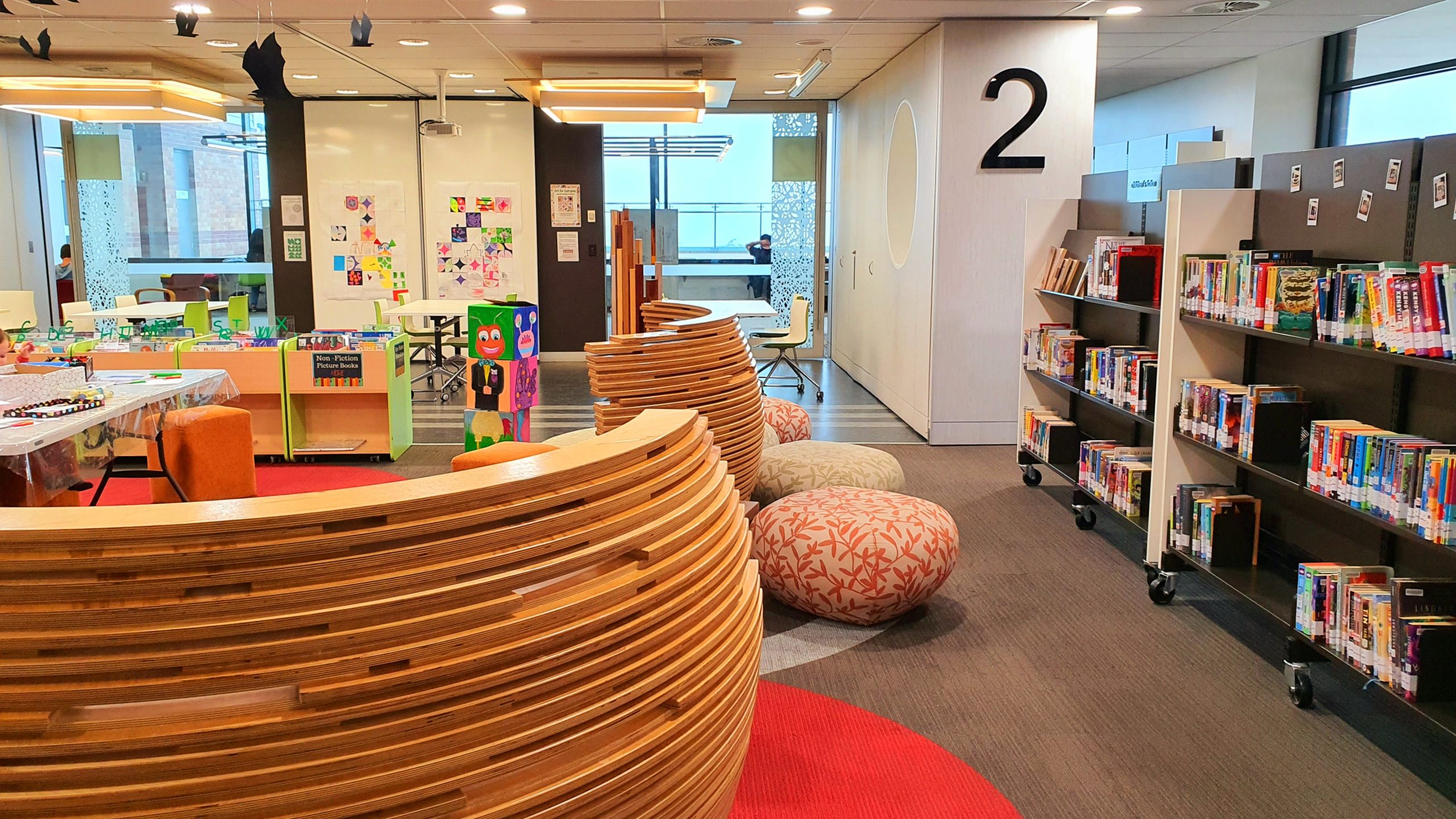
Katoomba Library: cool comfort, charging stations, computers, books and other ways to while away the hours productively.
Located in the Cultural Centre, Katoomba Library will spoil you with comfy seating options, modern décor in snazzy colours, Internet access and power charging for all your devices. Plus, there’s escarpment views (at the rear of the building), expansive windows and cheery lighting, board games, a magazine rack and books galore. Who could want more?
Entry is free to the general public including visitors from out of town. If you get the munchies, another air-conditioned space, the Coles shopping arcade, is situated on the level below.
OPENING HOURS:
Monday to Friday 10am – 6pm, Sat/Sun 10am – 4pm
LOCATION:
Blue Mountains Cultural Centre, 30 Parke St, Katoomba
WEBSITE:
https://library.bmcc.nsw.gov.au/
PHONE:
(02) 4780 5750
PUBLIC TRANSPORT:
Five-minute walk from Katoomba Train Station.
Wentworth Falls Library







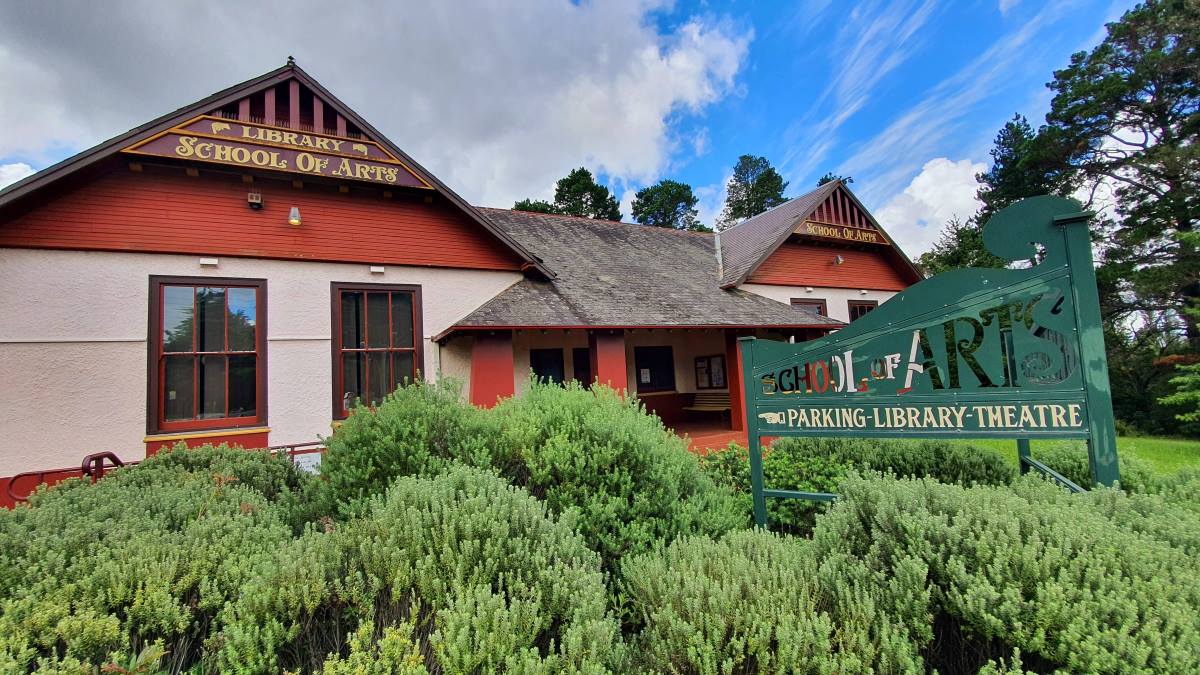
Wentworth Falls Library – convenient location in the village and on the highway.
Located in the Arts Centre, and in the hub of the village (just around the corner on the highway) the building has that old-world feel the Mountains is known for. However, the convenience of the car-parking space (round the back) is inconveniently limited to 15 minutes. If you drive, you may want to avoid parking here.
OPENING HOURS:
Monday to Thursday 1pm-5pm; Tuesday and Friday 10am-2pm; Saturday 9am-12pm
LOCATION:
School of Arts Building, 217 Great Western Highway, Wentworth Falls
WEBSITE:
https://library.bmcc.nsw.gov.au/
PHONE:
(02) 4780 5902
PUBLIC TRANSPORT:
The library is an easy five minute walk from Wentworth Falls train station.
Good Earth Bookshop, Wentworth Falls





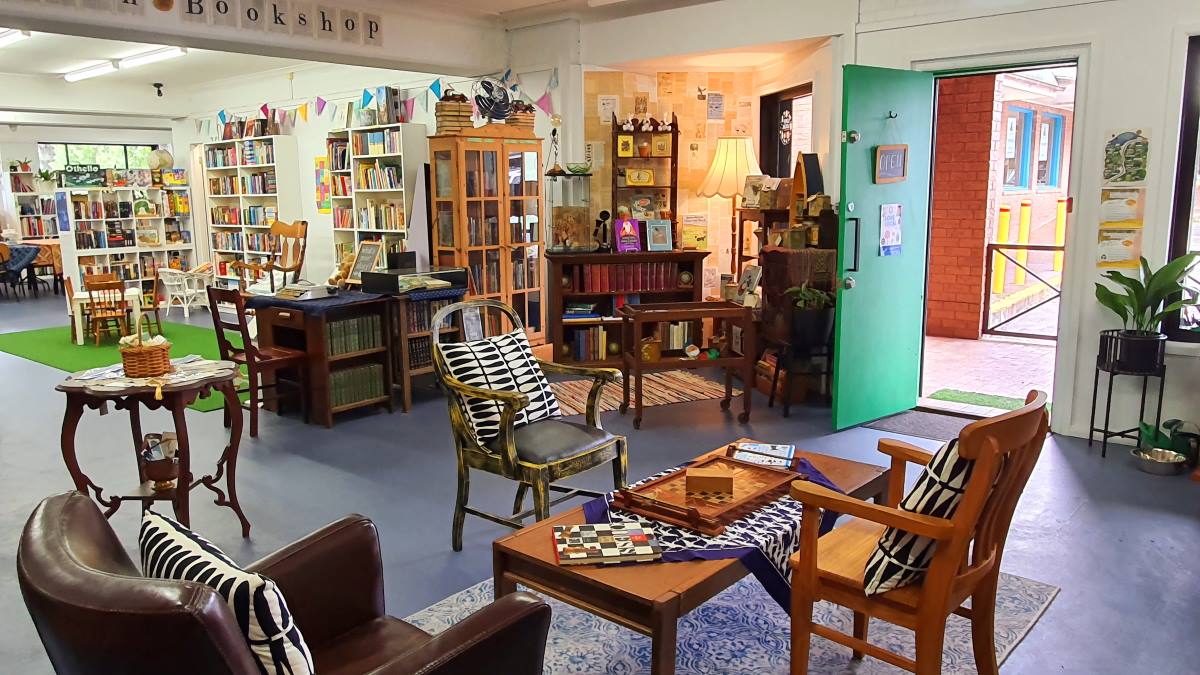
Good Earth Bookshop: a community-focused bookshop
In the arcade, behind The Lemon Tree Grocer, this local gem has the cosy vibe of a well-loved, community library. But it isn’t one. Browse the goodies here – preloved and new books, games, toys and gift ideas.
The welcoming chairs and free and cheap events (pay a $2 donation) held in-store give this bookshop the edge over others. There’s a regular Story Time for little ones, Make and Mend session, Create Space for teens, monthly Book Club and other stuff. Check out the site for what’s on when.
OPENING HOURS:
Tuesday to Sunday 10am-5pm, closed Monday
LOCATION:
Renae’s Arcade, 28-30 Station St, Wentworth Falls
PUBLIC TRANSPORT:
Renae’s Arcade is opposite Wentworth Falls train station.
Lost Bear Gallery






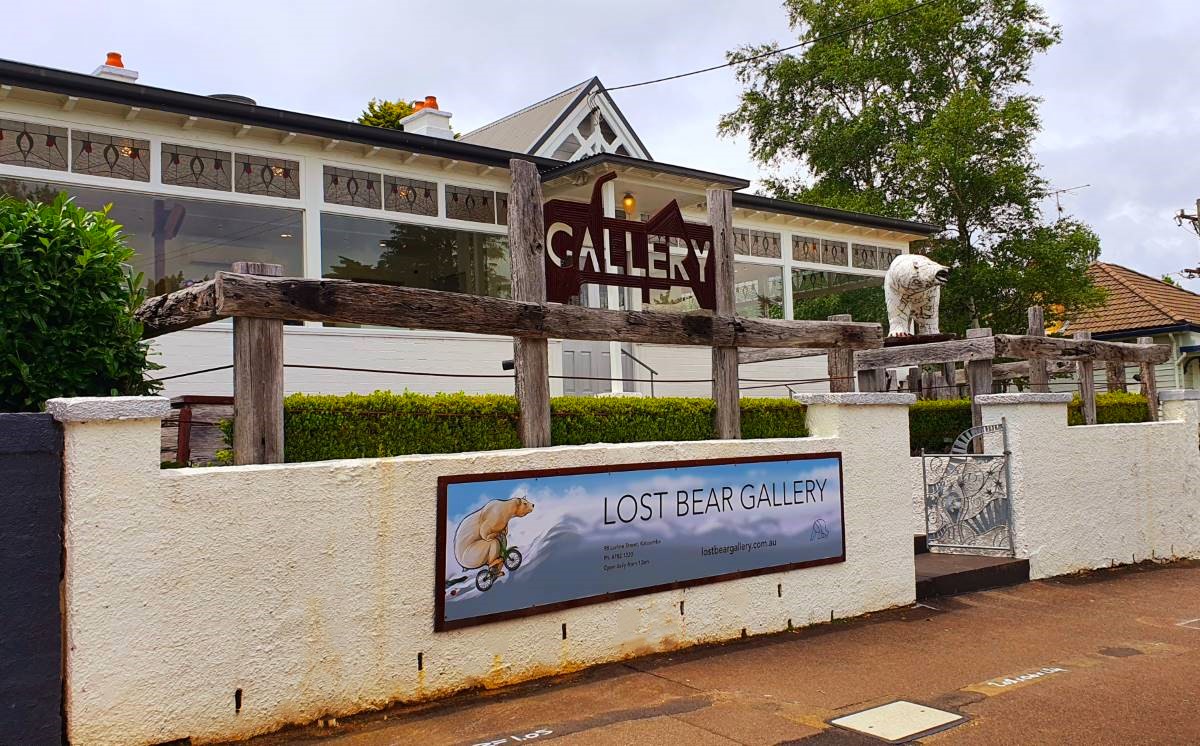
Get lost in the Gallery browsing local art and enjoy a chat with owner Geoff White.
With 12 rooms and alcoves of art to explore, plus a cute in-house pet dog, you can feel at home and while away the hours in this stylish former guesthouse. The ever-changing exhibits include contemporary art, paintings, sculpture, ceramics and glass art: much of it sourced from local talent, and for sale (if something grabs you). The owner recently confessed he spends a fortune on air-con, so go enjoy some of it and make it worth his while.
At the time of writing this article (life so often changes, doesn’t it) there was plentiful free street parking at the gallery door. One of the most popular art galleries in the Blue Mountains, Lost Bear is worth a visit in any weather. After you’re done here, you might check out the gallery next door and the smaller galleries on Katoomba Street (near the bottom roundabout).
OPENING HOURS:
Mon – Fri 10am- 4pm, Sat 10am-5pm, Sun 10am-4pm
LOCATION:
98 Lurline Street Katoomba
PHONE:
(02) 4782 1120
PUBLIC TRANSPORT:
From the heart of town, Lost Bear is a 10-minute walk while Katoomba Train Station is 15-20 minutes away on foot. The gallery is also one of the stops on the Hop On Hop Off Blue Mountains Explorer Bus. For a cheaper option, take the public bus.
Community Spaces
Many community spaces across the mountains offer indoor air-conditioned areas for Mountains residents. They are always free to access and can provide social interaction as well as a cool place to hang out. If you are feeling the heat head into one of these friendly environments. Take a book or some puzzles and settle in for a great respite from the heat.
Katoomba Sports and Aquatic Centre











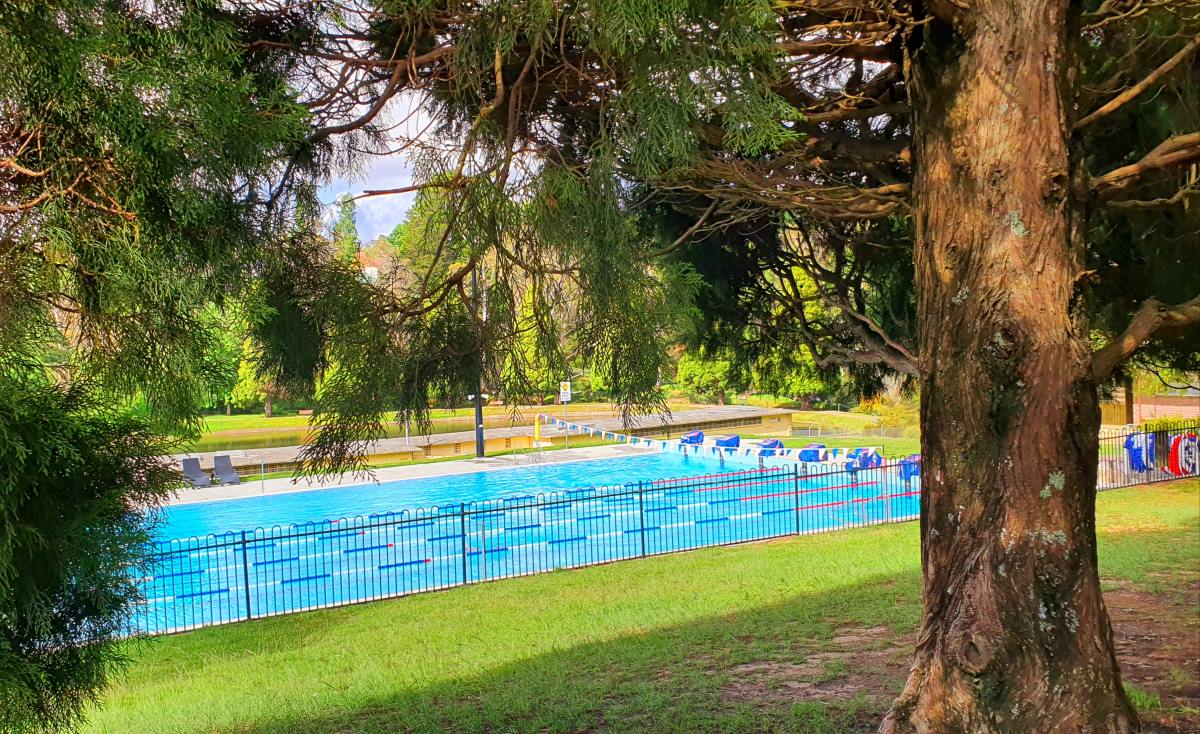
Part of the outdoor pool, Katoomba Sports and Aquatic Centre
Get cool in the pool. Choose from the 50-metre Olympic-sized outdoor pool or a 25-metre indoor option. There’s also a toddlers wading pool. Limited shade outside under the trees offers potential for a picnic, bevvy or siesta. Perks include free parking, an onsite kiosk, and free chilled water (by the indoor pool). BYO bottle.
Entry to the pool (at the time of writing) will set you back $7.10 per adult, $5.40 concession or $19.60 for a family. Patrons 75 and over or 3 years and under, and carers, can enter the swimming area for free.
OPENING HOURS:
Monday to Friday 6am – 8pm, Weekends 8am – 6pm
LOCATION:
Catalina Avenue, Katoomba
WEBSITE:
https://www.bmcc.nsw.gov.au/blue-mountains-leisure-centres/leisure-centres
PHONE:
(02) 4780 5156
PUBLIC TRANSPORT:
About a 20-minute walk from Katoomba Train Station. Or catch the Katoomba Golf Club Loop Service (686G) bus.
Katoomba Neighbourhood Centre – Belong Blue Mountains









The Neighbourhood Centre is a free, air-conditioned drop-in space where anyone is welcome to come. You can also grab a cuppa, biscuit (and fresh food when available) and socialise with others. A variety of free indoor community activities (open to all ages) are conducted in a separate room. These include the Natty Needles Craft Circle, board games, a Wellbeing Art Therapy group and a Book Club for Seniors.
For parents of little ones there’s a regular playgroup. Activities typically run over 10 weeks during school terms. If you’re driving, best to park in the Coles car park. For disability access, catch the lift down to Katoomba Street level.
OPENING HOURS:
Monday to Friday 9am – 4pm
LOCATION:
81-83 Katoomba Street Katoomba
WEBSITE:
https://www.belongbm.org.au/whats-on-uppermountains
PHONE:
02 4782 1117
PUBLIC TRANSPORT:
Belong Blue Mountains recently relocated from North Katoomba to the arcade between Rivers and the Salvo’s. It’s a five-minute walk from Katoomba Station.
Katoomba Street University









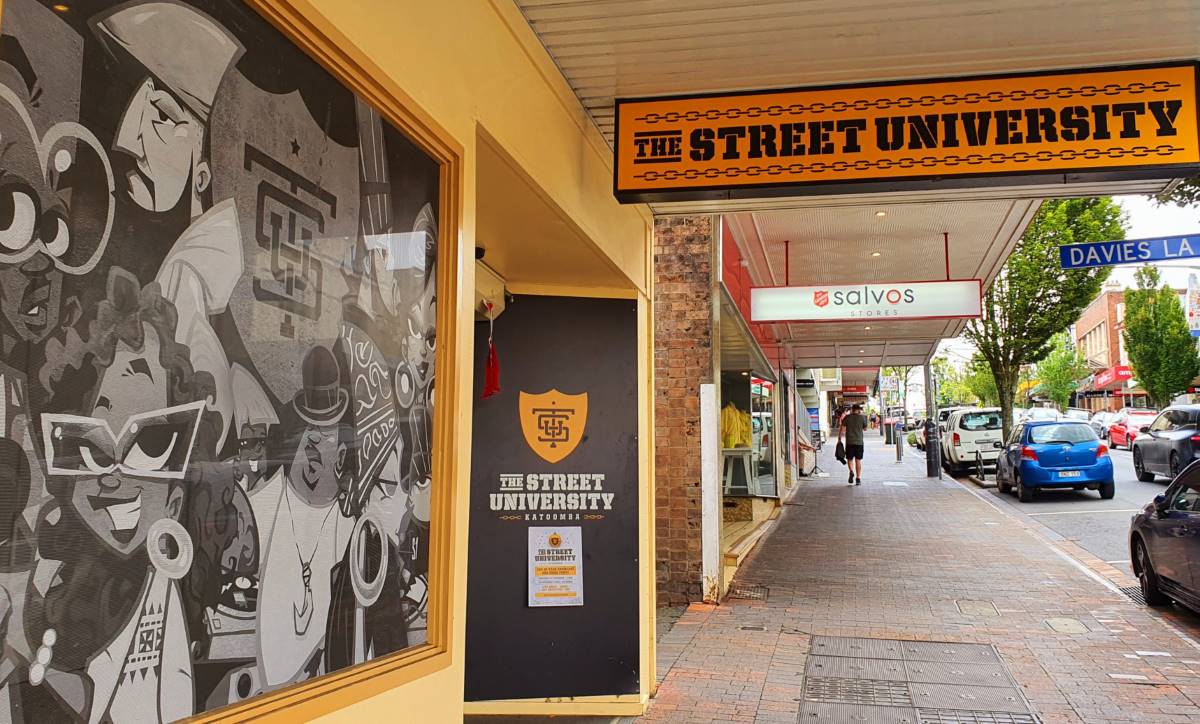
The Street University offers free activities and a hangout space for youth.
Found in the main drag of Katoomba, the Street University is a retail shop sized hangout for youth. Here, you can hang out with your mates, listen to music, learn dance, art or music skills for free or hop on a computer. Tap into the free counselling support (the Street University is funded by Wentworth Healthcare and delivered by the Ted Noffs Foundation).
There’s no need to book or make an appointment. Just walk in. However, to visit, you must be aged 12-25 and living, studying, or working in the Blue Mountains region or surrounding suburbs. More potential options for youth hangouts include the local youth centre, Myst and Headspace (both are in Waratah Street Katoomba).
OPENING HOURS:
Monday to Friday 12pm-7pm
LOCATION:
93 Katoomba St, Katoomba
WEBSITE:
PHONE:
1800 753 300
PUBLIC TRANSPORT:
Five-minute walk from Katoomba Train Station
Public Outdoor Areas
Climate scientists have found that being under tree canopies and shade is the best way to find shelter from the heat this summer. Trees cast shadows that are cooler than any other type of shading thanks to the water vapour they expel into the air during heat waves. This cools the entire area and can make natural, tree dense areas like parks, fire trails and reserves much cooler than urban areas.
Psychologists have also found that the sound of nearby water can have a cooling effect even if you don’t take a dip – so finding outside areas with water features such as waterfalls. Pools or creeks can also relieve the heat!
Leura Cascades




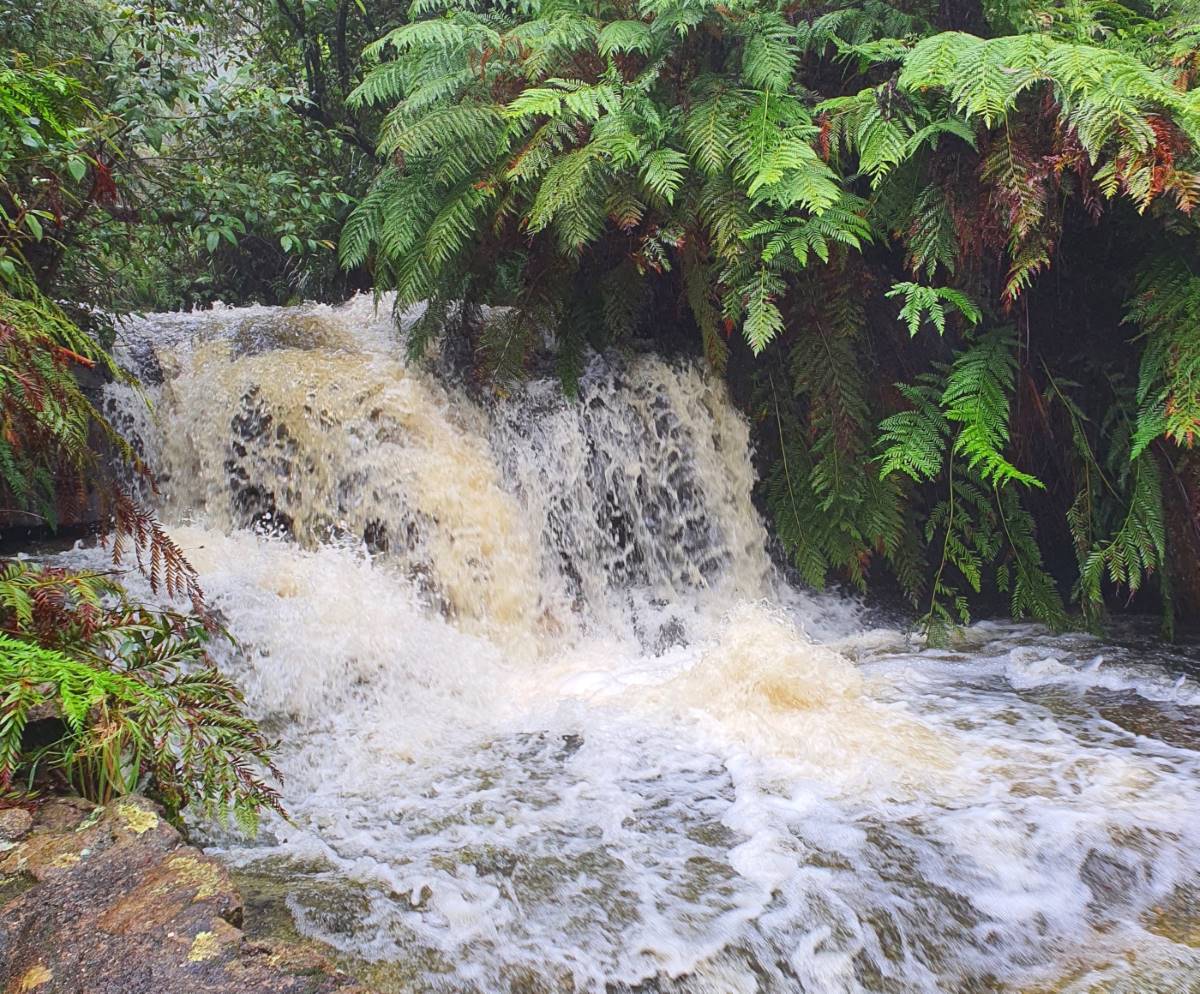
Cool natural habitat (but no swimming). Leura Cascades.
World-class views, cascading waters and native birds make the Cascades one of the most magical (and popular) bushwalks in the Blue Mountains. It’s also a suitable walk for kids. Score!
Along the short, mostly shaded loop walk, the flowing waters cool and stir the air. Allow about 40 minutes return, but add extra time for taking photos and enjoying nature. The Cascades walk ends at the lookout to Jamison Valley (where the Bridal Veil Falls drop) but you can also continue the descent to the bottom of the Falls. This takes, on average, a further 20 minutes and passes through Jurassic-style rainforest. On a sweltering day the bottom of the Falls is a stunning spot to cool off. Just remember, what goes down must come up!
A photo hotspot, you can dip into the eddying pools and be cooled by sprays of water from the Falls. The rocks are extremely slippery here. Do be careful. To access Leura Cascades, head to the bottom of Merriwa Street where it meets Cliff Drive (there’s an informal car park here), then walk through the barricade and follow the boardwalk and then the road down: roughly five minutes’ worth of time. Past landslides mean direct car access to the Cascades is currently closed. BYO drinking water.
SAFETY INFO:
The aquatic environment around rivers, lakes and lagoons can be unpredictable. If you’re visiting these areas, take note of these river and lake safety tips. See also these important bushwalking safety tips >
OPENING HOURS:
You can visit anytime when safe to do so.
LOCATION:
Chelmsford Drive, Leura
WEBSITE:
https://www.nationalparks.nsw.gov.au/things-to-do/walking-tracks/leura-cascades-fern-bower
PHONE:
Blue Mountains Visitors Information Centre – 1300 653 408
PUBLIC TRANSPORT:
The entrance to the Cascades is about a 30-minute walk from Katoomba train station. Alternatively, see the bus info for the Pool of Siloam.
Pool of Siloam, Gordon Falls Reserve, Leura







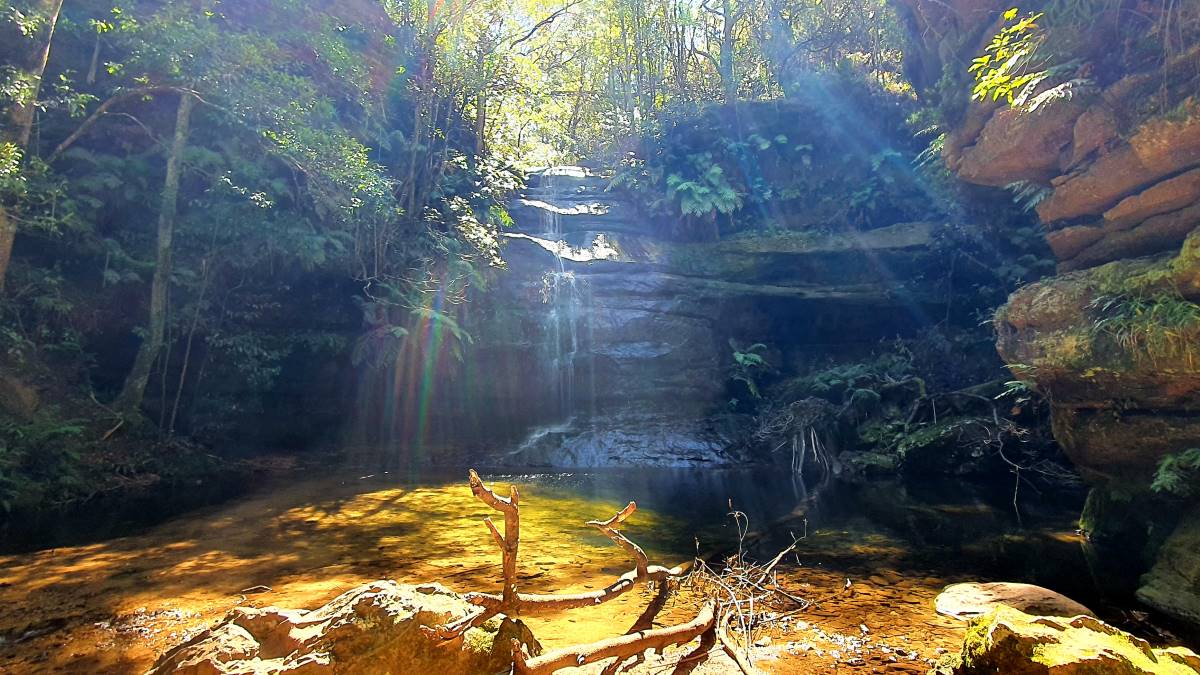
The cool, watery and shady expanse of the Pool of Siloam is a short walk from Gordon Falls Reserve.
From the placid, suburban grassed expanse of Gordon Falls Reserve Picnic Area it’s a 20- to 30-minute walk down to the wild beauty of the Pool of Siloam. Fed by a waterfall (from Gordon Creek), it’s a peaceful sandy spot of muted light and rainforest where you can take a dip or hang in the cool.
Siloam’s pool is a popular jaunt, so don’t expect to be alone. Take advantage of the amenities: car parking, public toilets, BBQ’s, picnic tables and some children’s play equipment. There are also a few shaded areas if you wish to linger here.
SAFETY INFO:
The aquatic environment around rivers, lakes and lagoons can be unpredictable. If you’re visiting these areas, take note of these river and lake safety tips. See also these important bushwalking safety tips >
OPENING HOURS:
You can visit anytime.
LOCATION:
Gordon Falls Reserve, Lone Pine Avenue
WEBSITE:
https://www.nationalparks.nsw.gov.au/things-to-do/walking-tracks/pool-of-siloam-walk
PHONE:
Blue Mountains Visitors Information Centre – 1300 653 408
PUBLIC TRANSPORT:
If you’re doing the tourist thing, both the Pool of Siloam and Leura Cascades are stops on the Hop On Hop Off Blue Mountains Explorer Bus. For a cheaper option, take the 695 public bus. You can also walk from Leura train station (about 20 minutes).
Wentworth Falls Lake










Wentworth Falls Lake offers a spot for a cool splash on a hot day.
Since its recent revamp, the foreshore of Wentworth Falls Lake has become a busy little place. A hotspot for families with young kids, picnickers and dog walkers, during summer it’s also a locals haunt for a quick cool-down and splash-about in water and a chill-out under the trees.
The Lake is actually a small man-made dam. Keep an eye on little ones. The usual hazards of water apply here. Take precautions and you’ll be fine. If it’s not too hot, there are also three fun kids’ playground areas. Visits from ice-cream vans, BBQs, water life including ducks and dragonflies, and boardwalks through the bush enhance the possibilities while you’re here. You’re also allowed to kayak or canoe on the lake. Parking fees apply although Mountains residents with valid permits are exempt.
SAFETY INFO:
The aquatic environment around rivers, lakes and lagoons can be unpredictable. If you’re visiting these areas, take note of these river and lake safety tips.
OPENING HOURS:
You can visit the lake anytime
LOCATION:
Sinclair Crescent Wentworth Falls
WEBSITE:
https://www.bmcc.nsw.gov.au/wentworth-falls-lake-park
PHONE:
Blue Mountains Visitors Information Centre – 1300 653 408
PUBLIC TRANSPORT:
A pleasant 10-15 minute walk from Wentworth Falls Train Station
Retail Areas, Pubs and Clubs
Some of our local retailers and service providers are more than willing to offer cool access to their premises for those struggling in the heat. You can also enjoy a drink or a meal although these are usually at an additional cost. Here are a few retail spaces that offer some free or cheap community access to air con, if you need it.
United Cinemas – The Edge










United Cinemas has the most generously chill air-con space in town. Another standout feature of Katoomba’s local cinema complex is the gigantic GMax movie screen with its comfy, tiered amphitheatre seating where the latest features are shown. Movies also show on two smaller-screen cinema rooms upstairs.
Kill more air-con time (and money) in the Arcade Zone or (for free) browse the art installations. Patrons can request a complimentary, chilled cup of water at the snack bar. There’s also free parking within the complex. To get to the cinema from the highway, whether by foot or wheels, turn into Civic Place at the traffic lights and drive past the Katoomba courthouse.
OPENING HOURS:
Various depending on movie session times.
LOCATION:
225 Great Western Highway Katoomba
PHONE:
(02) 4782 8900
PUBLIC TRANSPORT:
10 minute walk from Katoomba Train Station
Champagne Charlies (the lounge), Carrington Hotel, Katoomba












Divine in all seasons, the Carrington Hotel “Lounge” is all laidback cool and class.
Both cool and class are exemplified at Katoomba’s oldest cocktail bar. In the heart of town, the circa 1883 Carrington Hotel is a laid-back institution and key heritage (National Trust listed) site.
It has various venues and sections. These include accommodation, multiple bars, a cellar and deli, brasserie, the Grand Dining Room and more. To find Champagne Charlies (more informally known to locals as the ‘Caro Lounge’), wander up the iconic, grand staircase of the main hotel, through the entrance, past reception into the bar.
The Lounge has the comfiest seating (and arguably the best winter heating) in town. You’ll know you’ve arrived when you hear the soft retro music and experience the extravagantly high ceilings, stained glass windows and sense of having travelled backwards in a time machine. The low-key vibe attracts an older crowd, snug convos and creative types tapping away at laptops in the corners.
Along with cocktails, you can enjoy a cuppa here, the usual bar bevvies and even nothing (if your wallet is on the dry side). Pour yourself a water courtesy of the Carrington. No-one’s keeping tabs. Everyone’s welcome here, including kids (by law they’re not allowed to approach the bar area). There’s some free parking onsite or underground in the Coles car park (both are accessed via Parke Street). For wheelchair access, call the hotel. See you there!
OPENING HOURS:
Seven days, all day from 9am into the evening. Closing times vary.
LOCATION:
15 – 47 Katoomba Street, Katoomba
PHONE:
(02) 4782 1111 (Reception)
PUBLIC TRANSPORT:
Five-minute walk from Katoomba Train Station. Too easy!
Alexandra Hotel, Leura











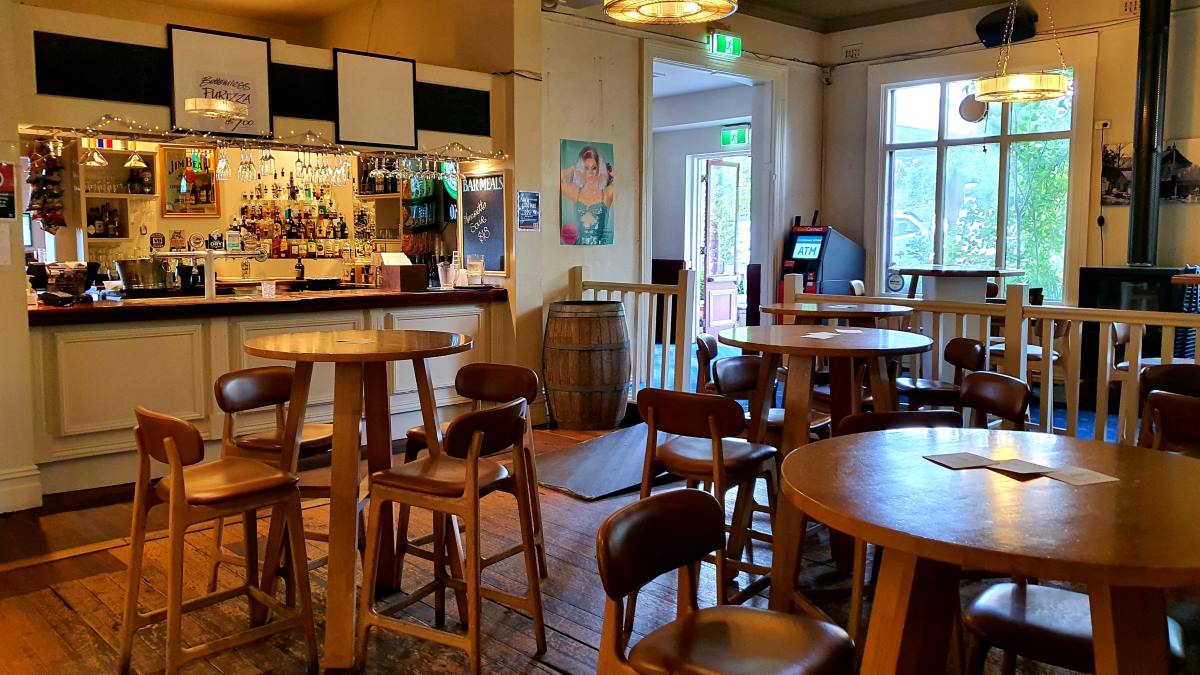
The Alex: super chill air-con and rock tunes
Named after Queen Alexandra, ‘The Alex’ (as it’s less formally known to locals), is Leura’s token pub. The renovated circa 1903 building has super chill air-con, and a few dim, indoor nooks where you can hide out from the heat (or cold) with a bevvy amongst loud rock tunes. There’s also trivia on Wednesday nights, live music Thursday and Friday nights and one of those big screens that feature the sport.
OPENING HOURS:
62 Great Western Highway, Leura
PHONE:
(02) 4782 4422
PUBLIC TRANSPORT:
The hotel is a two minute walk from Leura train station
This story has been produced as part of a Bioregional Collaboration for Planetary Health and is supported by the Disaster Risk Reduction Fund (DRRF). The DRRF is jointly funded by the Australian and New South Wales governments.
